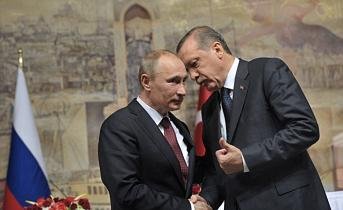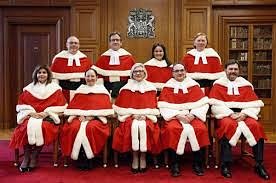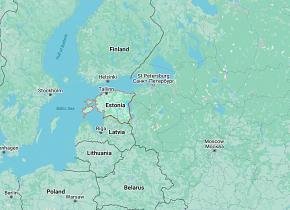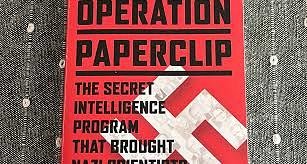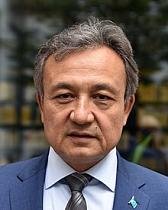Shaping Russo-Turkey relations: Putin meets Erdogan in Turkey over Syria, weapons deal
Russian President Vladimir Putin arrived in Moscow on September 28 for talks with Turkish President Recep Tayyip oh the situation in Iraq and Syria along with bilateral trade, among international issues. The two held a working dinner before a one-on-one meeting and a press conference at 9:30 pm at Erdogan's palace, the Turkish presidency confirmed it on its website.
A visit for improved relations
Amid tensed relations with US president Donald Trump, Russian President Vladimir Putin traveled to Moscow to meet his Turkish counterpart Recep Tayyip Erdogan for talks on Syria and a key weapons deal, hoping to strengthen an increasingly active relationship that has already troubled the West. The strenuous efforts of USA and Europe to keep Russo-Turkey antagonism has not worked as they had expected.
Despite a regional rivalry that goes back to the Ottoman Empire and the Romanov dynasty, Russia and Turkey have been working closely since a 2016 reconciliation ended a crisis caused by the shooting down of a Russian war plane over Syria. “Russia and Turkey are cooperating very tightly,†Putin's spokesman Dmitry Peskov said ahead of the one-day working visit by Putin to Ankara.
Turkey and Russia have been on opposing sides during the more than six years of war in Syria, with Russia the key backer of President Bashar al-Assad and Turkey supporting rebels seeking his ouster.
However, Russo-Turkish relations have improved considerably in recent time against the wishes and plan of the USA and Europe. Turkey, a strong NATO member, has signed a deal reportedly worth $2 billion to buy S-400 air defence systems from Russia, a move that has shocked its allies in the alliance.
Economic cooperation is also beginning to flourish, with Russian tourists returning to Turkey and the two countries working on a Black Sea gas pipeline.
In Syria both Moscow and Ankara are pushing for the creation of four “de-escalation zones†in Syria, in line with peace talks in Astana, to end the civil war that has raged since 2011. While Turkey's policy is officially unchanged, Ankara has notably cooled its attacks on the Damascus regime since its cooperation with Russia began to heat up.
Putin's visit came as Turkey and Russia are working to deepen ties in a turnaround for the two nations, which have backed opposing sides in Syria and nearly came to blows over Turkey's downing of a Russian plane in 2015.
The two leaders showered one another with praise in statements after their talks in Ankara, hailing a deal to de-escalate fighting in Syria. Moscow sides with Syrian President Bashar Assad while Turkey has supported his foes since the start of the Syrian civil war six years ago. But Russia and Turkey, together with Iran, are now working on setting up de-escalation zones in Syria that are credited with having helped reduce the fighting.
Erdogan said they focused on the specifics of securing a de-escalation zone in Syria's northern province of Idlib on the border with Turkey, emphasizing the shared political will to contribute to the Syrian political settlement. Putin, for his part, hailed "our friend, President Erdogan" for helping make the de-escalation deal possible, adding that it would allow to halt fighting and create conditions for the return of refugees to their homes. "I consider these agreements our common, extremely important success," Putin said. "The necessary conditions have been created for putting an end to the fratricidal war in Syria, completely destroying terrorists and allowing Syrians to return to peaceful life."
The Russian leader added that "we are creating conditions for the refugees' return, and for stepping up the search for a long-term political settlement in Geneva." Putin and Erdogan also talked about the Iraqi Kurdish referendum, with the Turkish president denouncing it as a "big mistake" that eroded stability in the region.
Kurdish Independence
Turkey, which is battling a more than three-decades-old Kurdish insurgency, strongly opposed the plebiscite, in which Iraqi Kurds voted overwhelmingly for independence. Turkey has said it considering economic sanctions against the semi-autonomous Kurdish region in Iraq and has not ruled out military action.
Russia's stance on the non-binding Kurdish independence vote is troubling for Turkey, for whom opposing Kurdish statehood is a cornerstone of foreign policy due to its own Kurdish minority. The Russian foreign ministry said that while Moscow supports the territorial integrity of Iraq, it “views the Kurds' national aspirations with respectâ€. “Russia has been trying to abstain from taking a clear stance on the issue and Turkey may be wanting to get some assurances and explanations,†Timur Akhmetov, Ankara-based Turkey expert at the Russian International Affairs Council, told AFP.
In public, President Erdogan has diplomatically shied away from attacking Russia's stance on the Kurdish referendum, declaring that Israel was the only state that backed the poll.
Russia has sought to maintain a neutral tone regarding the Kurdish referendum, but it underlined its support for Iraq's sovereignty and territorial integrity while emphasizing the need to avoid destabilization of the region.
At the same time, the Russian Foreign Ministry expressed Moscow's respect for the Kurds' interests and called for a dialogue between the Iraqi government and the Kurds to decide on a "mutually acceptable formula of co-existence within the integral state of Iraq." Putin referred to that statement without going into further details.
A Kurdish commander of the SDF, which has approached along the east bank with US jets and Special Forces, said the alliance expected to completely push IS out of its former Syrian headquarters of Raqqa within a month. With the Kurdish YPG militia at its forefront, the SDF said last week that, after seizing 80 per cent of Raqqa, the battle for the city had entered its final stages.
EU’s negative approach to Turkey’s entry as a legitimate member brings Russia closer to Turkey. By accusing German and Dutch governments of acting like Nazis by banning Turkish ministers’ addresses to fellow Turks in their cities on the grounds of security, Erdogan has destroyed much of the goodwill needed for Ankara’s successful application to become a full EU member.. In 1963 Turkey became an associate member of the European Economic Community, the predecessor to the EU. Turkey signed a Customs Union agreement with the EU in 1995 and four years later was recognized as a candidate for full EU membership. Subsequent negotiations had run into periodic roadblocks even before Ankara’s latest tensions with Berlin and Amsterdam. As an adversary of EU expansion, Putin was pleased to see Turkey’s chance of acquiring full EU membership rapidly diminish.
US-Russia cooperation?
As veto member, USA and Russia cooperate with each other and even coordinate their global moves.
Earlier, therefore, one got the impression that Russia entered Syrian bloody conflict on the request or advice of USA but now it looks that President Putin only wants to shield the ruler Assad to stay in power. Russia a close ally of Iran and it is helping Assad on Iranian request even while as a veto member it maintains close contact with Washington as peer the convention- according to which veto members would avoid a direct war among themselves. .
Turkey has also been hit by a spate of deadly bombings and gun attacks by the US sponsored militant Islamic State (IS) group and Kurdish militants over the past year and a half. ISIS, like Al Qaeda and Taliban, is the production of American strategic community led by notorious Neocons. But even while helping them secretly, USA pretends to be fighting all terrorist gangs. Russia and the USA back separate offensives against ISIS in eastern Syria, both of which are advancing in oil-rich Deir Ezzor province bordering Iraq.
Apparently, USA and Russia are not together in their respective wars in Syria. Moscow accused USA of targeting Russia in Syria and said Russian general killed in Syria because of US policy. The Russian defence ministry said the general had been killed by shelling near Deir Ezzor. Russian Deputy Foreign Minister Sergei Ryabkov said that “two-faced policy†of the United States was to blame for the death of Russian general Valery Asapov in Syria, RIA news agency quoted him as saying. “The death of the Russian commander is the price, the bloody price for the two-faced American policy in Syria,†Ryabkov told reporters, according to RIA. The Syrian Democratic Forces (SDF) alliance of Kurdish and Arab militias fighting with a US-led coalition said the attack killed one of its fighters and injured two.
A war monitor, the Syrian Observatory for Human Rights, said Russian rounds had not hit the SDF near Deir Ezzor. The SDF later said it had responded to the source of fire that targeted it from near the city of Deir Ezzor without specifying which forces it had attacked.
The ISIS assaults are converging on ISIS from opposite sides of the Euphrates that bisects the province, the jihadists’ last major foothold in Syria, with the river often acting as a dividing line. But their proximity has at times raised the risk of clashes that could stoke tensions between the competing world powers. With Russian air support and Iran-backed militias, Syrian troops are advancing along the west bank of the river.
Obviously, USA does not want to kill Assad but only wants to totally destabilize Syria as part of hidden agenda of US-Israeli fascist twins for Arab Spring and loot its energy as well as other resources. Meanwhile, US-backed Syrian militias said Russian warplanes struck their positions in Deir Ezzor province, which Moscow denied, generating friction between two rival campaigns against the militant Islamic State group. Major-General Igor Konashenkov of Russia’s defence ministry was cited by RIA news agency as issuing a denial, saying Russia was always careful to ensure its air strikes were accurate. A spokesman for the US-led coalition, Colonel Ryan Dillon, said rounds had hit in the area around the SDF but he could not confirm they were fired by Russia.
Erdogan enjoys popularity and power
An elected president has to be strong in order r to take steps to protect the sovereignty and of the nation and well being of the common people. USA, Germany and also ultra fanatic Israel badly want a anti-Islamic weak Turkey to maneuver thing with it so that they can get what they want from Ankara. They could engineer and execute a powerful coup in Turkey but, unlike their successful experiment in New York in September 2001, failed.
Islamic Turkey state survived. Turkish parliament approved presidential system, seen strengthening Erdogan. The Turkish parliament has backed a plan to strengthen the powers of the presidency, paving the way for a referendum on the issue in spring which, if passed, could allow President Tayyip Erdogan to stay in office until 2029. Erdogan says the reform will provide stability in the European Union (EU) candidate country at a time of turmoil and prevent a return to the fragile coalitions of the past. His opponents fear it will herald increasingly authoritarian rule.
The constitutional reform bill was approved with 339 votes in the 550-member assembly. The legislation needed at least 330 deputies to support it in order to go to a public vote. Erdogan, speaking for the first time since parliament's vote, called on his supporters to work “day in and day out†throughout the referendum campaign. “My people will give the final decision... I believe this referendum period will conclude with the will of our people,†Erdogan said at an opening ceremony in Istanbul.
After parliament's decision, and voiced support for the changes, Justice Minister Bekir Bozdags said: “A new door in Turkish history and in the lives of the Turkish people has been cracked open today. With our people's 'yes' vote, this door will be completely opened,†Bozdag wrote on Twitter. The leader of the main opposition CHP, Kemal Kilicdaroglu, said after the voting that his party would fight the changes in their referendum campaign.
Erdogan assumed the presidency, a largely ceremonial position, in 2014 after over a decade as prime minister with the ruling AK Party, which he co-founded. Since then, pushing his powers to the limit, he has continued to dominate politics by dint of his personal popularity on the basis of his Islamist policies. The reform would enable the president to issue decrees, declare emergency rule, appoint ministers and top state officials and dissolve parliament — powers that the two main opposition parties say strip away balances to Erdogan's power. With the reforms, the president will be allowed to retain ties to a political party, potentially allowing Erdogan to resume his leadership of the AK Party, in a move that opposition parties say will abolish any chance of impartiality. The plans envisage presidential and general elections to be held together in 2019 with a president eligible to serve a maximum two five-year terms.
Following the failed coup against Turkey, AKP and President Erdogan, western critics accuse Erdogan of increasing authoritarianism with the arrests and dismissal of tens of thousands of judges, police, military officers, journalists and academics since a failed military coup in July. Erdogan and the government say the extent of the crackdown is justified by the nature of the threat to the state from July 15, when rogue soldiers commandeered tanks and fighter jets in a violent bid to seize power. Erdogan on Saturday also revived the question of reintroducing the death penalty, which some of his supporters had called for in the wake of July's coup attempt.
Equation
Political and economic developments in the European Union or EU, Turkey and Russia are cumulatively aiding President Vladimir Putin to become an ascending star in the international firmament. In an unexpected twist, the supporting actor in this dramatic ascent is Turkish president Erdogan, a former staunch critic of the Kremlin in the Syrian civil war who is now aligned with Putin in hostility towards the EU.
At home, after aborting an attempted military coup on 15 July, Erdogan declared a state of emergency and unleashed a massive crackdown on political opponents. This led to the purging of almost 100,000 employees in state institutions and the arrest of 40,000, including judges, senior civil servants, academics, journalists, and police and military officers.
After corralling the parliament to amend the constitution to replace parliamentary democracy with an executive presidency, he has urged voters to endorse the radical change in the April 16 referendum, arguing rightly it is needed to avoid fragile coalition governments of the past and to give Turkey stability in order to meet security challenges in the future. His opponents fear an authoritarian, one-man rule by Erdogan.
Of course, his actions have unnerved Western leaders who expect an anti-Islamic regime to rule Turkey. By contrast, the Kremlin welcomes these in the context of an astonishing turnaround in relations with Ankara. Following Turkey’s downing of a Russian jet fighter, presumably on the advice of USA, in its airspace on November 15, 2015, Moscow imposed stiff economic sanctions on Ankara. As a result, annual bilateral trade plummeted from $38 billion to about $17 billion. But that clash in fact served as a milestone in the bilateral ties.
In the aftermath of the attempted coup, Putin made a congratulatory call to Erdogan. Three weeks later, Erdogan met Putin in St. Petersburg and thanked him publicly, saying that his call “meant a lot psychologically.†Putin announced that Russian trade sanctions on Turkey would be lifted step by step. Conversely, Erdogan was angered by EU and US. criticism over his crackdown on educational institutions, the judiciary and the media, including the jailing of 152 journalists. His Russia visit in August alarmed Western capitals. Since then, from the Western viewpoint, a stream of negative news, including two more meetings for the Turkish and Russian presidents, has continued.
Most of Erdogan’s statements against the West has made Russia a reliable ally of Istanbul. After his talks with Putin in the Kremlin on March 10, Erdogan declared that alliances like NATO or allies that ignore Turkey’s interests did not have the right to question what Turkey does to protect itself. He added that no one has the right to object to Ankara’s measures in Syria or current negotiations with Russia on the purchase of an advanced S-400 anti-missile defense system. Erdogan indicated that his latest meeting with Putin had created an environment for facilitating further security cooperation with Moscow as well as in economic and military sectors.
Erdogan’s recent spats with Germany and the Netherlands on the issue of Turkish ministers being allowed to persuade gatherings of Turkish voters settled in these countries to vote “yes†in the referendum have also gone down well with the Kremlin.
New dynamism
The Syria deal helped warm up ties and restore bilateral trade and the flow of Russian tourists to Turkey, halted in the wake of the 2015 plane incident. Erdogan underlined the need to prevent "even more serious mistakes," adding that "it's important that the international community sides with Iraq's territorial integrity and political unity."
Analysts say that while both countries share an interest in seeking to discomfort the West by showing off close cooperation, their relationship falls well short of a sincere strategic alliance. With Moscow's ally Assad now having the upper hand in the conflict; Russia will be hoping Turkey will bring the rebels it has supported into the political process. “Relations between Turkey and Russia may appear to be friendly, but they are loaded with contradictions and set to remain unstable in the near term,†Pavel Baev and Kemal Kirisci of the Brookings Institution wrote in a study this month.
Deliveries of the S-400s, meanwhile, could be years away due to orders from China, while Ankara's insistence on a technology transfer as part of the deal may also create problems. But both Moscow and Ankara are, for now, happy to send a message to the West that they are serious about defence cooperation. “They are trying to utilize the issue of the S-400 for their respective political interests,†Akhmetov told AFP.
In Ankara, Putin and Erdogan continue exchanging views on regional and bilateral agendas. Military and political cooperation, the Kurdish issue, the Syrian crisis and other important issues are expected to dominate the agenda between them. For strategic reasons, however, the two leaders didn't mention a deal for Turkey to buy Russia's most advanced air defense missile system, the S-400. Erdogan announced earlier this month that Turkey had signed a deal to buy the S-400s, drawing concern of some of Turkey's NATO allies who pointed that they aren't compatible with NATO weapons systems.
Despite their remaining differences, Russia-Turkey relations have seen significant progress over the past year. The dynamics have been positive. Apparently, Moscow and Ankara are ready to listen to each other and make concessions. Possibly, there are some points for cooperation even on Kurdish issue.
Turkey is a very important player in the political arena. Currently, a major continental Eurasian bloc is taking shape and both Russia and Turkey are part of the trend. This means serious advantages in the long-run.
Beyond Syria
The visit is a signal of positive dynamics in bilateral relations. The leaders of both countries have been involved in an exchange of opinions and joint consultations. What is important is that Moscow and Ankara have deepened their cooperation, including on regional stability and the situation in Syria and Iraq.
Since August 2016, Russia and Turkey have been actively developing military and political cooperation, primarily on the Syrian crisis. At the time, the groundwork was laid for an important future military and political deal. Since then, this cooperation has been positive for Syria. Moreover, Moscow and Ankara have signed a deal on the delivery of the Russian S-400 [missile defense system] to Turkey. There have also been several important regional agreements between Russia, Turkey, Iran and Iraq
The Putin-Erdogan meeting is an opportunity to take bilateral relations to a brand-new on the most important international issues, including the escalation on the Korean peninsula, relations with the USA and the Rohingya crisis in Myanmar. The talks could lay the foundation for transforming current cooperation into the form of an alliance between Moscow and Ankara"
The rise of right-wing populism in the EU – Brexit, improved performance by Geert Wilders’ Party for Freedom in the 15 March Dutch general election, and the lead position of the National Front’s Marine Le Pen in French opinion polls – is a contributory element. Another is the refugee crisis which has widened the base of Europe’s rightwing parties.
Erdogan’s good will has helped the grave refugee crisis in Europe under control. By closing Turkish borders with neighboring Greece, he drastically reduced the refugee influx into the EU. Equally, if he could reverse his decision that would certainly revive the crisis. EU must understand that former Ottoman Empire Turkey is a great nation with kind heart and end drama to delay the Turkey’s interest to be a part of EU as a great European power.
The hard core EU led by a few anti-Islamic members maintains its unwillingness to let an European but Islamic Turkey become its member as it is eager to have on amalgam of essentially anti-Islamic European Christian states. The restoration of the death penalty, which Turkey formally abandoned in 2002 as part of its European Union accession talks, would likely spell the end of Turkey's talks to join the bloc.
In fact, Turkish parliament's approval of the Presidential system is the answer to their challenges. Pakistan must also turn to the Presidential system as their present system has failed to protect the nation from coups by enemies of Islam and Turkey and bring political accountability and end corruption which is destroying the country.
True, today right wing parties are occupying the governments in the West. We are firmly in the age of dictators and Presidents-for- life. It is my way or the highway. Be it Modi, Putin, Netanyahu or Trump or Erdogan,. All of them crave power and control. Now it is all dictatorial powers in the hands of one man. Parliaments, legislature and courts have been effectively rendered irrelevant. Pakistan is almost following the same model. However, Erdogan has an Islamist ideology that makes him a class apart among the dictators.
Turkey was the last bastion of Muslim-majority countries, which has to some extent been open, progressive and democratic. As the Turkish hero, Erdogan is becoming a one-man-show, all pretenses of democracy notwithstanding.
West has a role in helping Turkey become a truly democratic nation to serve the cause of Islam and world peace. USA and Germany should stop meddling with domestic affairs of Turkey and stop engineering coups to harm the ruling party and government or destabilize a only Islamic nation in Europe. However, entire Europe and USA are free to opt for Islamic path of life and governance, if they are able to see the genuine truth, for the sake of world peace and genuine security.
Fighting Islam is not the way..
Global Muslims wish progress and prosperity for Turkey.
Comments
There are 0 comments on this post



